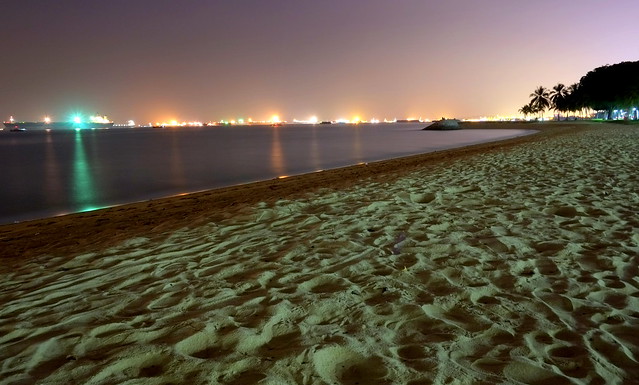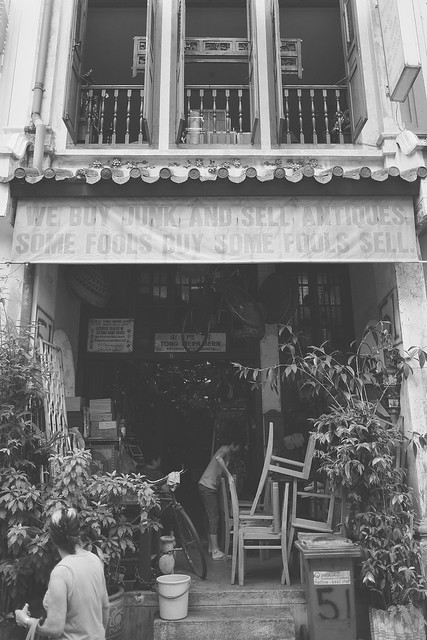"Dr Tan Lai Yong" is a name I have heard many a times during my conversations with my friends regarding serving in the community. However, apart from knowing his contribution towards improving the health care of a rural village in China, and that he was a student in Temasek Junior College (the topic causing my friend to bring up his name), I knew little else about him. The opportunity in finding out more about him came when my course manager from Temasek Polytechnic posted a link about Dr. Tan giving a talk in the school. The brief introduction about Dr. Tan intrigued me and I spent some time thereafter finding out as much as I could from Google about him. The information I unearthed left a deep impression; I found him to be a really inspiring character, yet I could not but help feel a certain sense of dreadfulness in response to a situation I have found myself in. Dread not in the sense of any negative connotation, but of being in awe, and perhaps a sense of reverential fear.
In this article, the writer recorded how Dr. Tan told the solemniser to recite these verses from Proverbs as his wedding prayer:"Two things have I asked of You [O Lord]; deny them not to me before I die: Remove far from me falsehood and lies; give me neither poverty nor riches; feed me with the food that is needful for me, Lest I be full and deny You and say, Who is the Lord? Or lest I be poor and steal, and so profane the name of my God." This was not something that I had expected to hear as a wedding prayer. To quote the article: "In Dr Tan's words, it was the “craziest thing” he has ever done. It set the tone for life thereafter, and liberated him to “step out of the box”, again and again." His wedding prayer did not go unanswered:
"At 53, the Singaporean doctor has no home to his name. No car. One pair of jeans he lives in. And lots of hand-me-down checked shirts. Lunch is often a loaf of plain bread, wolfed down on the run." I found this, along with his contributions in China then and in Singapore now to be really inspiring and respectable. However, what really shook me was the fact that I was prompted to say this prayer as well when I struggled with letting go of my own desires for academic excellence (
recounted here). The verse also liberated me, spurring and challenging me to trust that what the Lord provides is sufficient. With the buzz of events that happened lately, it appears that my prayer was something that the Lord wanted me to learn beyond my struggle towards academic excellence. This was not something I had expected and what I found out about Dr Tan set the tone for how I should respond to the situation I have found myself in.
Unlike most of my peers, I came back to Singapore in the summer of 2013 without any legal internship position arranged during my summer break. Since I had a fair amount of free time available, I decided that I should do something productive by looking for law firms that were offering positions for legal training and training contract (all these to fulfil my requirements to become a qualified lawyer). Thankfully I managed to secure a position at a particular law firm (let's call it Firm A) - having gone for the interview and feeling positive about what they told me about certain features of the firm, I accepted their offer for the trainee position. Although I was thankful that I need not be concerned with finding a place for training during my final year, I couldn't help but wonder why the Lord has arranged for this particular place for me to train at whilst at the same time blessing me with grades that allowed me to apply to places that may appear to offer a more prestigious and high flying career. It felt paradoxical that the Lord was, on one hand, dealing with my then-hidden ambitions for academic excellence vis-a-vis career path, and on the other, blessing me with more than what I need. Anyhow, I recall talking to a friend back then that the receiving of the result could be a test too - will I take what He has given me (which belongs to Him) and turn it into mine to further my plans? I knew well then that it was an act of God for me to receive the grades I did in my second year; if so, am I to frustrate His grace? Despite the acceptance of my training position in Firm A, I still harboured a plan at the back of my mind to attempt another career path (let's call it X) if I manage to graduate with the required result.
Shortly before the release of my examination results and degree classification, I used the lyrics from "Be Thou my Vision" as my prayer: "Heart of my own heart, whatever befall, still be my vision, O ruler of all". It would have been a lie to say that I was not feeling nervy at all whilst waiting for the results to be released. But despite my apprehension of the outcome, I didn't want my desires to cause me to lose sight of having to set my focus upon Him and trusting in His provision. Strangely enough, as I was praying for this matter a few days before, I felt a prompting signifying the sort of result I would receive, but I was not to use it for applying for X. In the words of someone, it was odd that I will receive such a direction - not to even apply for it. Eventually, what the prompting signified came to pass, and I decided to obey it and not make an application for X.
Although my decision then seemed strange then, I subsequently realised why the Lord had directed me in such a manner. Back then, Firm A had not finalised my training allowance and I had yet to find out from other trainees how it is like. When I eventually found out about my allowance and other matters, it was significantly below what I had expected. That, along with other factors, would have caused me to choose X above Firm A should I get an offer (though unlikely) - and it would have been much harder for me say "no" to an offer for X. It was through this that I realised my previous stance on how I wasn't going into the legal industry for its money or material benefits was shakier than I'd imagined. It caused me to re-assess why I studied law in the first place: "
Defend the poor and fatherless: do justice to the afflicted and needy. Deliver the poor and needy: rid them out of the hand of the wicked.". If this was truly my motto, then why the comparison with my peers who are getting training allowance that's twice of mine, along with a whole load of other benefits? It was at this period when I stumbled across the article on Dr. Tan, along with the verses: "
give me neither poverty nor riches; feed me with the food that is needful for me, Lest I be full and deny You and say, Who is the Lord? Or lest I be poor and steal, and so profane the name of my God."
To say that there was no struggle against the fulfilment of my own prayer 1 year ago would have been deceiving myself. When I said that prayer back then, I didn't expect it to go beyond the realm of my academic pursuit. It was as though a spectre of my past was back to haunt - but why should I see it as something haunting me? Is this not a blessing and provision from my Provider - my all in all as I have claimed? Why then the revolt against it? With the benefit of hindsight, it was as though I was living in the realm described aptly by C.S. Lewis:
As a young man wants a regular allowance from his father which he can count on as his own, within which he makes his own plans (and rightly, for his father is after all a fellow creature) so they desired to be on their own, to take care for their own future, to plan for pleasure and for security, to have a meum from which, no doubt, they would pay some reasonable tribute to God in the way of time, attention, and love, but which nevertheless, was theirs not His. They wanted, as we say, to "call their souls their own". But that means to live a lie, for our souls are not, in fact, our own. They wanted some corner in the universe of which they could say to God, "This is our business, not yours.”
My reaction (with dread) veered towards the exact perilous attitude that I had sought to avoid: to take what He has blessed me with and call it mine. I was faced with the options before me: to obey, or to take flight. Perhaps one may be inclined to feel that God appears to be uncharitable, or worse still, playing what is seemingly a mean joke on me by frustrating the very capacity He has produced with giving me a first class degree - "the monkey trick of a spite imbecile". But probe deeper, and one realises it is a marvellous lesson planned. As Paul said, "
for I have learned in whatever situation I am to be content. I know how to be brought low, and I know how to abound. In any and every circumstance, I have learned the secret of facing plenty and hunger, abundance and need. I can do all things through him who strengthens me." I have been learning to be content when I am in abundance (or at least I will like to think so), but can I learn to be content when I am not enjoying what society may deem as material abundance, where my monthly training allowance is probably less than that of working at a fast food restaurant and my working hours far exceeding that? I cannot say I know how to be content in whatever situation He has placed me in if I have only known abundance. Thus for now, the challenge is to learn to stay put where He has directed till the appointed season. I said earlier that I felt a reverential sense of fear. How could I not when I am stepping into the unknown of endless insecurity (in human terms) again; yet knowing simultaneously that it is in the surrendering and stepping out that I am secured by His love and grace.
It was not too long ago when I told someone that as I sang the song
"Oceans", I felt that the Lord has led me to the point where my life felt like it was in an unknown state, where I cannot feel my feet anymore: adrift amidst the currents. But I made it through that point of time in life - somehow. Perhaps I will be facing the same again, where the waters will be even deeper. But as crazy as it may be, I choose this again - "Spirit lead me where my trust is without borders".
"Heart of my own heart, whatever befall, still be my vision, O ruler of all".










